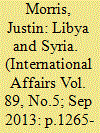| Srl | Item |
| 1 |
ID:
123892


|
|
|
|
|
| Publication |
2013.
|
| Summary/Abstract |
This article examines recent UN Security Council deliberations over events in Libya and Syria and in particular assesses the extent to which Council members sought to justify their positions and voting behaviour by reference to the 'Responsibility to Protect' (R2P).
It shows how limited invocations of R2P were with regard to Libya, before proceeding to demonstrate how, somewhat paradoxically, R2P-sceptics such as Russia and China subsequently drew upon concerns over the manner in which NATO implemented its UN-mandate in Libya to cast doubts over R2P during debates over Syria.
Contemplating the implications of the Libyan and Syrian cases for the future of R2P, the article concludes by arguing that the concept's international standing can best be preserved through the excision of its most coercive elements; R2P should be reconstituted as a standard of acceptable sovereign behaviour and a mechanism geared towards the provision of international guidance and support, while decisions over coercive military intervention, inevitably infused with considerations of strategic interest, should be made outside the R2P framework.
|
|
|
|
|
|
|
|
|
|
|
|
|
|
|
|
| 2 |
ID:
145730


|
|
|
|
|
| Summary/Abstract |
The emergence of the Responsibility to Protect (R2P) owed much to the need to enhance the UN’s ability to act forcibly in the face of the most extreme cases of gross human suffering. Too often in the past such responses were emasculated or thwarted by the necessity to successfully navigate the UN Charter’s prescriptions over the use of force, by the unwillingness of member states to provide military forces, or by a combination of the two. In accepting that certain types of inhuman activity can lead to the legitimate use of force within the UN Charter framework, the adoption of R2P appeared to resolve at least some of these problems, and as such it offered hope to those wishing to see the UN adopt a more assertive response to the grossest of human rights abuses. But, using stalemate over Syria as its backdrop, this article demonstrates the dubiousness of the claim that such a normative development can ever trump the hard edged political and strategic factors which determine when states will accept and/or participate in the use of force, and it suggests a radical solution to the dangers inherent in R2P’s intimate association with military intervention.
|
|
|
|
|
|
|
|
|
|
|
|
|
|
|
|
| 3 |
ID:
077885


|
|
|
|
|
| Publication |
2007.
|
| Summary/Abstract |
The United Nations Security Council (UNSC) is at the heart of the world's collective security system. It is upon this body that rests 'primary responsibility for the maintenance of international peace and security' (UN Charter, Article 24). In this article, we examine the current debate regarding the legitimacy crisis facing the UNSC. We consider its most usual manifestation, namely that the Council faces a crisis of legitimacy because of its inability to constrain the unilaterally inclined hegemonic United States. But we also examine the converse argument that it is the whole UN collective security mechanism (rather than just the Council) that is in crisis. According to this, it is the failure to recognize the unique dangers immanent within the contemporary security environment and the inability of the UN security system to tackle these which is the cause of the current crisis of legitimacy. International society, this position continues, must acknowledge these, and vest in the hegemon the powers it requires in order to meet its global responsibilities. Acknowledging the implications of both of these positions, we argue that the resolution of the current crisis of legitimacy is to be achieved through a more expansive interpretation of the Security Council's extant powers, accompanied by a commitment on the part of the United States to reinvest in the multilateral machinery upon which global order is founded
|
|
|
|
|
|
|
|
|
|
|
|
|
|
|
|